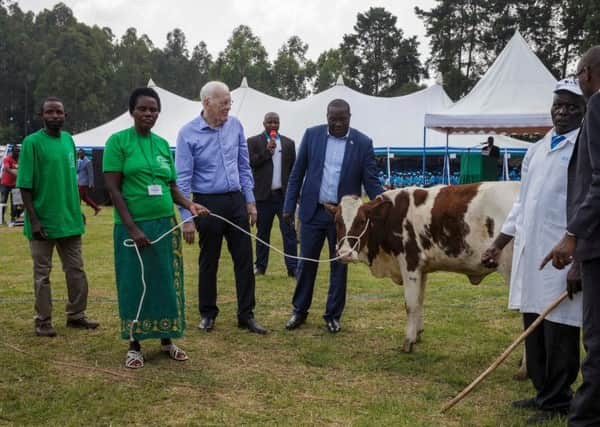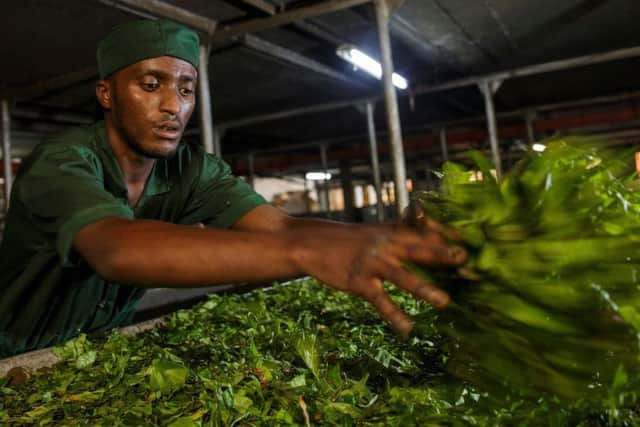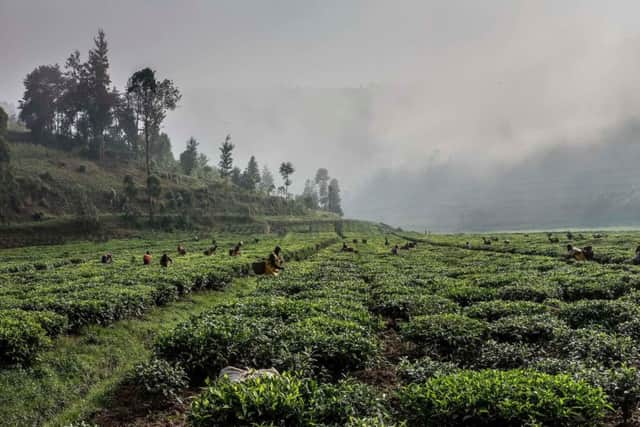Rwanda's rock star welcome for oil tycoon, Sir Ian Wood


Soon, as the city gives way to the country, the roads are full of folk heading to market with bundles of tobacco, eucalyptus and charcoal stacked high on bikes and heads. Yellow buckets of fermented banana moonshine, which has a texture like porridge, swing from handlebars.
The route climbs higher into the mountains – and deep into tea country. Vast fields of dark green bushes roll out ahead and hundreds of farmers are spotted at work in the mist, heads down.
Advertisement
Hide AdAdvertisement
Hide AdIt is in fields like these that Sir Ian Wood, the Aberdeen billionaire and philanthropist, is leading a revival of the Rwandan tea industry and building a new prosperity for some of the country’s poorest smallholders.


At present, his ventures account for around a quarter of the country’s tea production. In the next decade, that could possibly double. At least 12,000 farmers have seen their incomes roughly treble in the past four years.
Wood is in Rwanda to meet colleagues and attend a celebration of the achievements of The Wood Foundation Africa, a branch of the charity set up to distribute a share of his £1.6 billion family fortune derived largely from the North Sea oil boom.
A makeshift arena has been built on a football pitch close to the tea factory at Mulindi and 5,000 farmers, from the young to the very old, take their seats, some walking through the night to get here.
Wood, who at 75 still works six days a week, can’t bear to retire and is rarely seen without a clutch of business papers to study. He is not someone you would associate with mass celebrations and outpourings of emotions.


But, as he steps into the arena, a frenzy begins.
The farmers are on their feet , arms are waving and the singing gets louder as he moves among the people. Dancers pound the ground, circling the billionaire, clapping and smiling. Babies are passed over for a hug from the Scot who, tall and pale and in a blue business shirt, is beaming away.
“Frankly, I find it embarrassing,” he says later. “My sons said it was like the reception given to a world famous rock star. They were gobsmacked.
“If it was a UK crowd I would be really embarrassed, but these are really poor farmers, and they are really genuinely positive and happy about what has been happening, so I wanted to show I was happy for them. I was trying to let the farmers know that I had seen them, as well as them seeing me. That is what it’s all about – these people. It is about nothing else.


Advertisement
Hide AdAdvertisement
Hide Ad“The real comfort I got was that after the celebration, these people would go back to their ordinary lives and that those ordinary lives would be better than they were before.”
It is five years since Wood led the buyout of the Rwandan government’s majority share in two tea factories, investing $12 million in the plant at Mulindi and another at Shagasha in the south.
Meanwhile, millions more have been poured into supporting around 12,000 smallholder farmers who supply the green leaf for processing both through long-term loans for seeds and fertilisers and farmer schools to encourage better quality tea and higher yields.
Once the factories are running and governed to Wood’s satisfaction, the majority share will be gifted to the smallholders.


This is charity, but with a hard business heart, or venture philanthropy as Wood calls it. This is sustainable, long-term investment in people, skills and product. Wood, although super rich, is always seeking value.
At times, he has been frustrated with the lack of progress and talks of hostile board meetings, suspicious farmers and aggressive questioning around his intentions when he first arrived in Rwanda.
Things are a lot smoother now and celebrations like the one at Mulindi help to assure him things are now on the right track. According to the foundation, Wood’s East African interests – including projects in Tanzania and Kenya – potentially impact on 360,000 people.
Has the tycoon, not known for talking up his remarkable business achievements, reached a happy place with his African ventures?
Advertisement
Hide AdAdvertisement
Hide Ad“A happy place? Never in my life would I say I was in a happy place. If I was in a happy place I would just stay in my bed in the morning.”
Reflecting on progress made in the continent, he adds: “I used to think the bottle was empty. Now I think it is half empty.
“I am always looking at how we can do more, how we can do better. The work never ends here and that is because the hardship never ends.”
Earlier Wood spoke of a “eureka experience” at the plant in Shagasha, when thousands of farmers turned up to greet him last year. It was the first time he had thought that what he was doing in Africa – a “huge leap into the unknown” – was working.
But despite the joy of the occasion, Wood left feeling concerned. Thousands of people were queuing up to get transport home, with mothers and babies among those forced to wait for a long time before leaving.
“We moved the mothers and their children up to the front of the queue so they could get out of there first. It annoyed me, I left feeling a bit discontented but it passed and I could enjoy that moment again. We just had to make sure it didn’t happen again,” he says.
A huge expansion of The Wood Foundation Africa work is now under way with some major partners involved in an $180m investment including Unilever and tea giant Luxmi, which is about to embark on its first operation out of India.
Both firms will build factories, with TWFA supporting the preparation of two virgin greenfield sites in Rwanda – plus a third in Tanzania – and the smallholders who will farm them. The UK Department for International Development has also invested.
Advertisement
Hide AdAdvertisement
Hide AdThe farms at Nyaguro and Rugabano will be the biggest in Rwanda and could potentially double the country’s black tea production, with 8,000 smallholders and 2,000 staff due to support the enterprise.
But the challenges are complex. The land is steep, typically on a 7 per cent incline, and zipwires may have to be brought in to transport the tea.
The areas, which sit close to the border with Burundi, were among the hardest hit by the 1994 genocide, during which up to 1 million people were slaughtered in just 100 days – the overwhelming majority of them Tutsis. Now, elderly women may be the only ones left to run their family’s smallholding.
Wood and his partners will attempt to effectively rebuild communities and a local economy where, in parts, 60 per cent of people are underemployed and 19 per cent live in extreme poverty with an income of less than $1.25 a day.
Wood said: “The new sites will be extremely challenging in many ways. We are reasonably confident that we can make a big difference here. A lot of men were killed during the genocide so what we are trying to do is pull the population back and attract people from other parts of the country.
“It’s a significant development. Both greenfield sites are very large farms, each twice the size of Mulindi, but we will only be able to do this if we get the people back.”
The celebration at Mulindi is over and Wood heads to the boardroom at the tea factory for a hot drink. Surprisingly, he pulls out teabags brought from Scotland from his travel bag. He prefers decaffeinated these days, he says. He offers out the packet of shortbread that also travelled with him.
He is tired after the four-hour event in the intense sun which included speeches from the Rwandan agricultural minister and local governor who was an MP in President Paul Kagame’s government for 13 years. Smallholders have lined up to share stories of their new wealth and recent purchases, which include motorbikes, cows and school places for children.
Advertisement
Hide AdAdvertisement
Hide AdWood has eyes on further investments across East Africa that will fit his venture philanthropy model.
“I don’t want any more money,” he says. “Honestly, this is all about what we can do with some of the money that we have.
“I know it sounds corny, but I suppose, I have travelled the world and frankly I was shocked at how much money was being earned and how little of it was going where it should go, and that is into the livelihoods of the populations.
“What we are doing in Africa is actually tiny, absolutely tiny. But if we all did something tiny, who knows what might happen?”